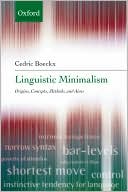

 |

|

The average rating for Linguistic Minimalism: Origins, Concepts, Methods, and Aims based on 2 reviews is 3 stars.
Review # 1 was written on 2019-02-10 00:00:00 Eric Harmon Eric HarmonThis is probably the easiest book to read in minimalism. it's a basic introduction to the program; it doesn't give the tools needed to know how to analyze a linguistic phenomenon. |
Review # 2 was written on 2017-11-17 00:00:00 Linda Monson Linda MonsonSo, I tried not to be prejudiced. And yes, there are some interesting ideas in the book, I'll give Boeckx that. Nevertheless, the book includes: a) yet another generativist babbling about the alleged poverty of stimulus: "We do not know in advance which of the various instantiations of the minimalist program will prove correct. In the same way that the US Supreme Court once defined pornography, we will only know what it is when we see it." (page 195) Well, if you plan to "see" it in a way comparable to how you (fail to) see all the evidence against your Poverty of Stimulus argument that has been accumulated since the 1970s, then there really is not that much for you to see. b) a lot of enthusiasm, and a plethora of admiration for Chomsky... like, really, a lot, and there is a chapter called "The Minimalist Seduction" in it, which sort of speaks volumes; c) even more enthusiasm and admiration for Chomsky; we all have our teachers and role models and stuff, but accepting whatever they say as the perfect and inherently right acme, that is not what linguistics should be about; d) a lot of quotes about physics, and then the author trying to convince you that this is not about trying to "exploit the prestige of the natural sciences"; e) several variations on the generativist-arrogance theme: ignoring empirical evidence and relying on arguments based on (pseudo) logic only, blatantly trying to convince you that whatever is presented to you is true and indisputable, not even mentioning that there are alternative and preferred views; similarly, just like other generativists, Boeckx does not bother mentioning that the whole innate-language-faculty thing is just a hypothesis, and, in fact, quite a lousy one in a lot of linguists' views (my personal favorite is Michael Tomasello's 2009 note titled "Universal Grammar is dead"; by the way, it is quite funny that the only thing - apart from the infamous (and wrong) poverty-of-stimulus argument - that is quoted in support of the language-faculty HYPOTHESIS is a quote from Darwin (1871) saying that we all (barring pathology) display an "instinctive tendency" for language; f) the ridiculous and misguided assumption that language is perfect etc. etc., "supported" by quotes from Kepler, Galileo, Einstein, and the like, saying things like "nature loves simplicity" and "there is unity at the foundation" (which totally proves that there is some magical language faculty in our brains that can generate all the languages around the world, even though it is super simple and based on like two or three basic rules, right?); g) utter failure to grasp how language works with respect to noncompositionality and certain other aspects (for instance, the attempt to explain why "A man seems has been arrested" is not a grammatical English sentence is hilariously all over the place; the author's statement "In many of these cases, I find it hard even to imagine an alternative approach to these phenomena" sounds, within the context of the book, surprisingly convincing (no shade...); h) also, the author and his fellow Chomskyans fail to realize that just because language is, in a sense, natural doesn't mean that linguistics (or biolinguistics, as Boeckx would have it) should steal ideas from natural sciences, and describe language using them; for example, Boeckx's argument for a modular approach to language is based on the fact that "micro-modularization is often the key to success in science" - well, nice, but linguists have manifested that the modular approach is not a satisfactory one at least a thousand times in the last four to five decades, so...; i) a couple of times, the author admits that there dare to be critics of the Minimalist Program or generativism in general, but he never bothers proving them wrong, he only dismisses the criticism as "in fact unwarranted," or something of that kind. Not cool. --- Edit: Now I discovered a great review of Mark Baker's 2015 book Case by Martin Haspelmath, who says: Baker does briefly justify his goal of elegant description ("Ockham's razor, elegance, learnarbility, and so on", p. 11), but in view of its subjectiveness, one should be skeptical about elegance as a truly scientific goal (as opposed to pedagogical - of course, grammatical descriptions should be readily understood by human readers, and therefore avoid tedious repetition). Baker emphasizes the "explicitness and precision" of generative grammar (p. 1), but more than these I would value objectiveness, testability and replicability, and these are difficult to reconcile with [the goal of language-particular elegant description (for descriptive adequacy)]. |
CAN'T FIND WHAT YOU'RE LOOKING FOR? CLICK HERE!!!